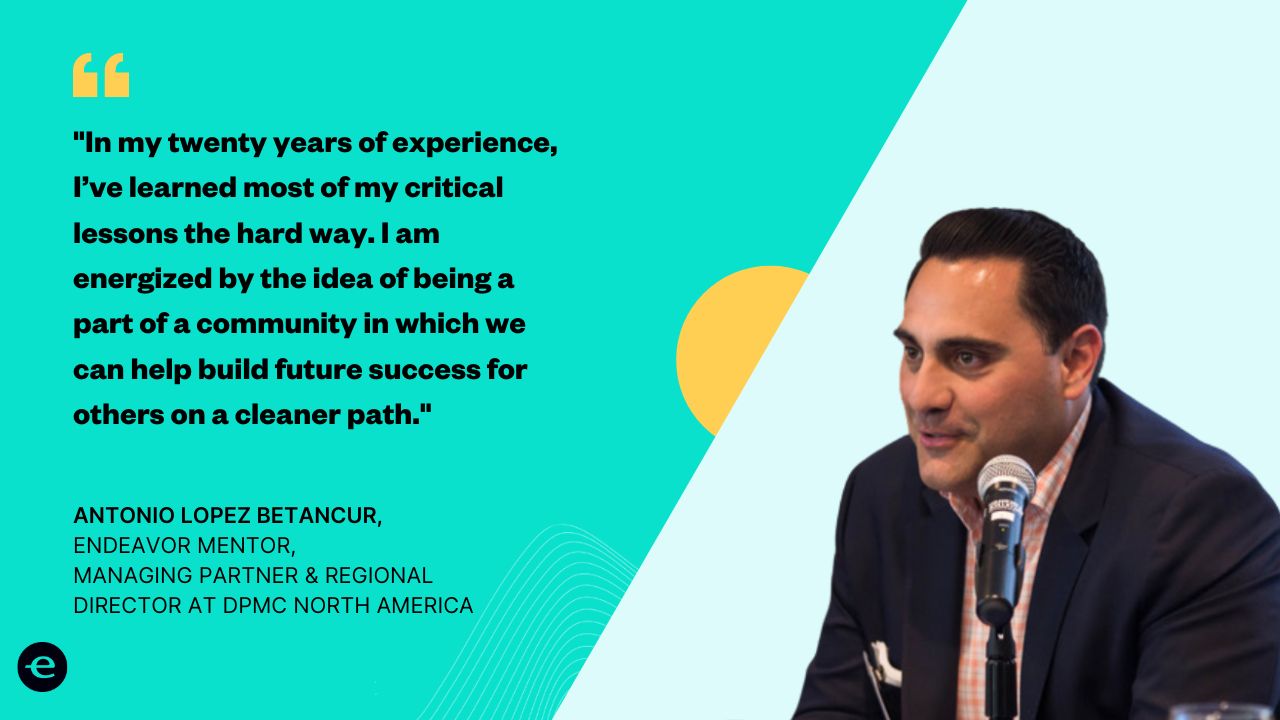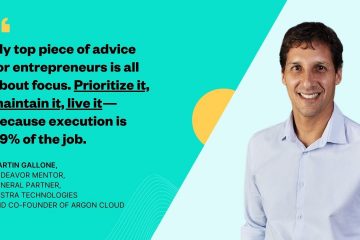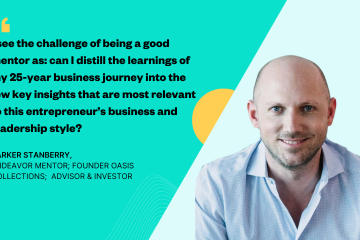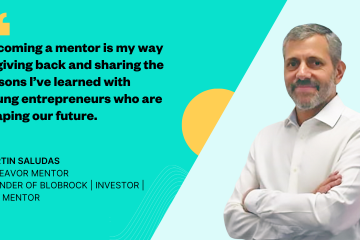Get to know our Endeavor Mentor Antonio J Lopez Betancur, Managing Partner & Regional Director at DPMC North America, in this mentor spotlight.
Why did you decide to join the Endeavor Network?
I first heard of Endeavor around the time they started building their presence in Miami. The work of building an ecosystem to support entrepreneurs through the lifecycle of their businesses seemed like something really valuable. Not just for the entrepreneurs but for South Florida as a growing global business hub and for the communities that these new businesses could positively impact. Over time I’ve monitored their progress and that of their members, including Rappi in Colombia, where I’m from. Having recently exited my consulting practice and as I’m considering a pivot into the Venture Capital space, it seemed like the right time to reach out and see how I could be involved and support Endeavor’s mission.
Tell us about your background and why you decided to become a mentor.
My background is quite varied. In total, I’ve worked in 12 industries in 28 countries across five continents. I started my career in Finance but was forced into entrepreneurship during the Great Recession in 2009. I co-founded a call center in Colombia and was fortunate to have a successful early exit. I then spent several years running my own management consultancy, mostly advising American companies that wanted to establish or grow their presence across LATAM. By 2016 I was learning that while I had a successful services business, the absence of technology and real IP meant that I could likely never exit. Around that time, I was approached to join a small team that was developing enterprise Blockchain solutions for large private market transactions. In a short timeframe, I was able to work on projects for the Department of Defense, WeWork, and even led our tech team in deploying a solution for Microfinance in Africa in 2019. I stayed on as an advisor to the company after we successfully closed our Series A, but accepted an opportunity to serve as regional CEO for a startup consultancy in the ESG space. We were able to grow the business rapidly during COVID, scaling to over a dozen countries, and building partnerships that enhanced our proprietary solutions with IP we aggregated from strategic partners. Earlier this year, we exited that business, which is why I have been actively considering opportunities in the VC space.
In my twenty years of experience, I’ve learned most of my critical lessons the hard way. I am energized by the idea of being a part of a community in which we can help build future success for others on a cleaner path. I also enjoy being able to apply so many of the things that I’ve learned in a way where it can be implemented quickly to create value for a maturing business. The other attraction of mentoring is relationships. Most of my success has come from relationships and I want to continue to build on that but also hopefully help catalyze success for someone else.
What are the most important qualities and characteristics that mentors should have?
Resilience, discipline, and a focus on people are the critical characteristics for successful entrepreneurs. In my view, what a good mentor in any discipline does is help people to build those qualities. To help an entrepreneur be resilient in the face of business challenges, a mentor should have patience and a big picture perspective. This approach can help to ground and guide a founding team that might be hyper-focused on a particular problem at the expense of more long-term needs. In many cases founders are younger than me and come from technology backgrounds. I hope that my experience working at large multinationals can contribute to their operational excellence as they scale. This is how I think about discipline. In terms of the human focus, I think what we can contribute is to help the founders we work with to grow and evolve with their teams and their businesses, not just as founders but as people. We should help them to be tied to a sense of purpose and to the impact of their work. I hope that in doing this work well, I can make my own contributions to the ecosystem Endeavor has built.
Any general advice for entrepreneurs?
I’ve been asked this question quite a bit because of my previous work with corporate ventures. My first piece of advice is to be sure you want to be an entrepreneur in the first place. It’s been easy, especially in the midst of a booming market, to glorify entrepreneurship. For those of us who have been through it, especially through challenging macroeconomic cycles, the reality can be quite different. My intention is not to discourage anyone but to show people a more complete picture of what this career path entails so they are better prepared to weather the difficult moments. This also applies to timing. A talented individual with a great idea and skills might be ideally suited, but they may have a young family and a mortgage or other obligations. I’ve seen great people make forced pivots simply because they needed a bit more stability at a particular time in their lives. Lastly, I advise people to think beyond their idea or short-term needs. What would happen if they were wildly successful? Do they envision themselves scaling a company, running large teams, or dealing with regulators or institutional investors? What would happen if their endeavor fails? Do they have the maturity, EQ, and professionalism it takes to manage conflicting stakeholder priorities through a storm? If a person can understand all these things and still wants to take the risk in order to make their vision a reality, then they are on the right path.
What are you reading?
Niall Ferguson’s “The Square and the Tower” about networks and power in society
Simon Sinek’s “Infinite Game” about leadership mindset
Marcus Aurelius “Meditations” on philosophy and Stoicism
These responses have only been edited for grammar.



